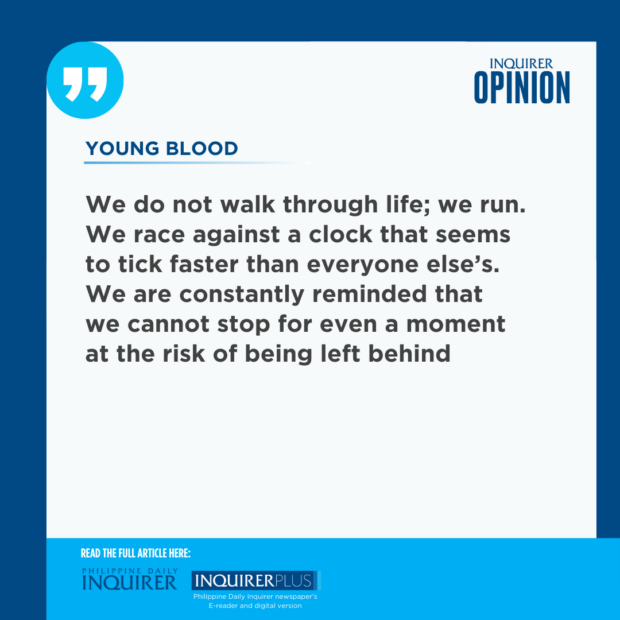A thousand steps per second

The scent of lavender and notes of jazz music filled the air as my friends and I entered a fine dining restaurant in Quezon City. Having grown up in a low-to-middle-income family from Oriental Mindoro who is now studying in Metro Manila for medical school, I have always looked forward to dining at fancy establishments. Instead of the beloved carinderia and home-cooked meals I grew up eating, my classmates would invite me to come with them to their go-to restaurants—their “hidden gems in the metro” as they like to call it.
The humble fried tilapia is now a pan-seared salmon. The iconic stainless steel silver cup in every Filipino home is now a fancy wine glass. Even the size of the spoon and fork is now ridiculously large (for reasons I still don’t know and will never understand).
Having had a full scholarship to put me through medical school, it feels weird that I am now friends with and sitting among future doctors who come from political dynasties, children of renowned doctors, and heirs of successful business owners. With each visit, I learned more and more from them about how to adapt and act appropriately in such settings.
Article continues after this advertisementHowever, there is one thing that I find hard to change.
While most of them were barely halfway done with their plates, I noticed that I was done with mine in a few minutes. I didn’t even realize how quickly I was eating my food until I looked up to see everyone’s plates after I was done. Most of the time, their plates were barely touched amid the background chatter. As I waited for them to finish their plates, I tried to get the last strand of pasta or grain of rice on my utensils and scraped every bit of sauce on my plate clean.
Was I too fast, or were they just slow? I usually ask myself. But this is no isolated incident. I realized that I get easily frustrated with how people walk so slowly on the streets and even in the hallways at school. It’s as if everyone is floating mid-air with each stride while I hastily weave through the busy crowd.
Article continues after this advertisementThough not backed by any scientific evidence, I have come to the conclusion that poor people move quickly, whereas rich people do things slowly.
When I was younger, during birthday celebrations or family events with tons of food on the table, my parents would usually say to me, “Bilisan mo kumain baka maubusan ka.” My cousins and I would rush to get the final piece of fried chicken or a scoop of ice cream before it ran out. While walking in the streets, my parents would instruct me to walk faster to get home earlier and to protect my belongings—for snatchers are more likely to target naive, slowly walking pedestrians. This state of always needing to hurry has become the new tempo of my life since then, even when there’s no real reason to rush at all.
Put simply, poor people don’t have the luxury of time. Not being able to savor every bite in fear of not being able to have the next one. Not being able to enjoy each step of walking home in fear of one’s safety. We live in a rush because there is always that fear that something is at stake—whether it be food, money, or safety. Afraid of losing something that is already very little to begin with. For those with less, time is not a friend but an enemy you must outrun.
We do not walk through life; we run. We race against a clock that seems to tick faster than everyone else’s. We are constantly reminded that we cannot stop for even a moment at the risk of being left behind.
Funnily enough, my classmates often say that I am jittery and move too quickly. But when you live in a world that will not wait for you, you do not have the privilege to slow down. Mistakes are more costly, stakes are higher, and time is more unforgiving—failing to achieve my dream would not only mean personal disappointment but also losing the lifeline and safety net for everyone I love. While my peers can afford the privilege to take all the time they need to find their footing in their careers, I am asked to walk on a tightrope over a fire as I race against time.
I eat fast and walk fast—a fact I am proud of. I do my absolute best and push myself not out of ambition alone but because slowing down isn’t an option. It is a testament to my mission of ending the cycle of struggle my family has experienced for years.
Amid all the rush, I can’t help but long for the day that I get to savor each bite of an expensive meal with my family in a Michelin-starred restaurant, casually stroll along the streets of BGC at nighttime while enjoying the city lights, and just breathe on a sunny Sunday morning with not a single worry in my mind. That one day, I won’t have to live life in a rush anymore. That maybe, just maybe, I can give my family all the time that they need—not to survive, but to finally live.
But until that time comes, I’ll continue taking a thousand steps per second.
—————-
Maxine Francesco Gwyneth C. Baculo, 23, is a fourth-year medical student at the University of Santo Tomas-Faculty of Medicine and Surgery.
















